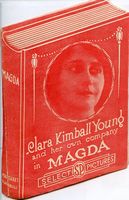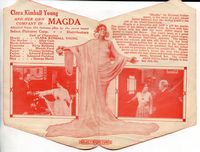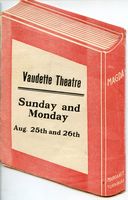

Magda (1917) C.K.Y. Film Corp. Distributor: Select Pictures Corp.; Select Star Series. Director: Emile Chautard. Scenario: Margaret Turnbull. Camera: Jacques Bizeul. Cast: Clara Kimball Young, Alice Gale, Valkyrien, Kitty Baldwin, Maud Ford, Thomas Holding, Edmust Fielding, George Merlo. Edward M. Kimball. Famous opera singer returns home and finds herself treated as a child by her domineering father. 5 reels. This film is apparently LOST
It was the first film produced by her own C.K.Y. Film Corporation after her break with Selznick, and was filmed at the old Thanhouser studio in New Rochelle, N.Y.
 | A herald for the film--front, inside, and back views. The inside picture is recycled from the photo session used to advertise Camille. |
 |
 |
| Magda | Clara Kimball Young |
| The Mother | Alice Gale |
| Marie Schwartz | Valkyrien |
| Franiska | Kitty Baldwin |
| Theresa | Maude Ford |
| Pastor | Thomas Holding |
| Father | Edward Kimball |
| Kellner | Edmund Fielding |
| Max | George Merio |
The first of the C.K.Y. Co. pictures starring Clara Kimball Young, and released through Select, is an adaptation by Margaret Turnbull of Herman Suderman's "Magda," directed by Emile Chautard. As a piece of literature the story ranks among the standard classics, but as a play it never gained any general popularity. The reason for this is that it is a study in psychology and not a drama of action. Then again, whoever is responsible for changing the entire point of the story in the film version, must be blamed for very nearly ruining it. Magda leaves home to become a singer and while away has an affair with a lover which culminates in a child being born to her. She gives herself to her lover of her own free will. In the picture it is disclosed that she had been tricked by "a ruse" into believing she was really the man's legal wife. It makes all the difference in the world, and while it may have been done as a sop to the sensibilities of picture patrons--"the family trade"--the foundation upon which the story was built was transformed into quicksand. As a piece of fine, up-to-date picturizing, artistically staged and directed, with wonderful photographic effects, exceptionally good acting, etc., "Magda" may be set down as the last word in pictures. Miss Young looks more beautiful than ever and seems to have improved in her acting. The role of the father, as played by Edward Kimball, stands out like a blue white diamond in a black camera setting. It is by far the finest thing he has ever done before the camera.
"Magda"
Clara Kimball Young in Five-Part Screen Version of Sudermann's Powerful Drama Does Justice to the Work in Its New Form--Released by Select Pictures Corporation
Reviewed by Edward Weitzel.
The screen version of Herman Sudermann's play, "Magda," with Clara Kimball Young in the title role was made by Margaret Turnbull and directed by Emile Chautard. It presents the story interestingly and in a clearly told manner, but it does not comprehend entirely the German dramatist's work. The three-act English stage version made by Louis N. Parker, in which Mrs. Patrick Campbell appeared, gives the character of Magda its full scope, as Sudermann drew it. The Turnbull heroine is a much more discreet young woman and, although her early life at home and her career in Berlin are pictured on the screen, the spectator is not given as deep an insight into her past as is revealed in the original play. The stroke by which Magda defeats her narrow-minded but desperate old father, who is determined she shall consent to wed Kellner or not leave the room alive is not even hinted at in the screen version. It is the master stroke of the drama, however, and lifts the story to its greatest tragic height.
[Photo omitted--Young watched by several other people]
The value of "Magda" consists in the logical treatment of its subject--the effect of a narrow and brutal parental authority upon a sensitive and ambitious girl. Magda is driven to rebellion by her father's harshness. She leaves home to become a singer, is betrayed by a man she had known as a child, and succeeds in her ambition. Received everywhere as a great artist, she is invited to become the guest of honor at the place where she was born. She accepts, meets her sister and is urged to return home. The reconciliation with her father is complete until he learns that she has been betrayed by Kellner, who is now anxious to marry her. The horrified old man grasps at the offer as the one means of preserving the family honor, but Magda will not have it so. She knows Kellner and despises him. When her father tells her she shall marry her betrayer or he will kill her the desperate woman frees herself by demanding of the pitiless old bigot how he knows that she is fit to become Kellner's wife. The blow is too much for the old man; he falls into a chair and dies. Magda goes back to her life in the world outside.
The theme of this play justifies such a conclusion. Like father, like child. Unreasoning opposition to the will of another had been instilled in the girl from her birth, and when the clash with her father comes she does not hesitate to use any means in her power to gain her ends. It is also one of the profound touches of the author that whether Magda spoke the truth or not remains unanswered in the mind of the spectator. In excluding this vital point from the screen version the picture will probably achieve a greater popular success. Sudermann is still strong meat for many minds. In the present form of the play only the over-prudish will take exception to the story it unfolds.
Clara Kimball Young is a beautiful Magda and indicates distinctly the phases of the character given her by the Turnbull version. Edward Kimball's impersonation of Magda's father is forceful and consistent and he does not resort to any unpleasant manifestation of physical weakness after he suffers the paralytic stroke. Competent characterizations are given by Alice Gale, Valkyrien, Kitty Baldwin, Maude Ford, Thomas Holding, Edmund Fielding and George Merlo.
The production always commands respect, and a disposition is shown to relieve the play of much of the sordid atmosphere that surrounds it in the printed book and on the spoken stage.
SELZNICK PICTURES
MAGDA. (Eight Parts--April)--Magda is a beautiful girl with a gift for music. The pastor of her father's church falls in love with her. He gets her father's consent to ask her to marry him, but Magda doesn't love him. The father tells her that she must either marry the pastor or leave his house. Magda leaves his house and goes to a neighboring city as companion to an old lady. The father closes his door to the girl.
Ten years later at a great musical festival in the town, Magda, now a great singer, known as Maddalene dall'Orto, appears. She is wealthy and famous, and made much of by the governor and other high officials. Her father announces he will forgive her and insists that she leave the hotel and stay under his roof. Once under his roof, he begins again to treat Magda the great singer as he treated Magda the girl of sixteen. The pastor, whom she refused and who still loves her, has been instrumental in getting her to return to her father's home. Magda does so on the condition that her father will ask no questions about her outside life. The father resents this condition. Magda shocks their staid friends. She amazes them by her wealth, offers to dower his sister Marie so that she can marry well.
Magda meets at her father's house the man who years ago when she was alone and friendless, studying music, betrayed her. He is now a rising man and anxious to appear immaculate in the eyes of his fellow-townsmen. In his interview with Magda, he learns for the first time that he has a child by her, that to support this child from starving Magda, in her early days, sang in cafes and anywhere to earn money. The father enters and learns there is something between them, gets the truth from Magda, determines to challenge Von Keller, and avenge his honor and that of his daughter. Von Keller tells him he is willing to marry Magda. Magda doesn't want this. she can't make these provincial people understand that she has a tremendous career in the world of art. Her father insists in treating her as an erring daughter who must be guided by him for the best.
Magda finally, out of love for her father and at the persuasion of the pastor, consents. Von Keller tells her that she must give up her career, and informs Magda that he doesn't intent to recognize their child. Magda's indignation flares up at this. She orders Von Keller from the home--utterly refusing to disown the child. His father gives his word of honor to von Keller that his daughter will do as he wishes. He tries to force Magda to do this, locks the door and threatens to kill her and himself unless she consents. As he aims the pistol at Magda he has a stroke of paralysis and dies. Magda is left free to live her own life.
 |
[click for larger view of picture]
"Magda" (Select Pictures)--Three years ago the academicians of drama avowed that the quartet of great European dramatists could not be translated to the screen. We refer to Iben, Shaw, Hauptmann and Sudermann. One by one the works of thse msters have recently made a deep impress on the photoplay. Only Shaw remains untried. This brings us around to Clara Kimball Young and her presentation of Sudermann's masterpiece, "Magda." Here is human life taken at its most exalted and its drabbest moments. Sudermann's plot has been copied many times in so-called original photoplays, never quite with success. Clara Kimball Young, in her depiction of a brilliant young girl confined to bigoted home surroundings and who in future years becomes a great prima donna and returns home to find the man who has wronged her an evil genius in her family, has surrounded herself with a well-balanced cast. Each sordid or noble characterization stands out like a fine-cut cameo. Miss Young's rendition of facial emotions has never been clearer or stronger. At times, when perhaps a higher emotion is expected, she appears a bit petulant, but that can easily be forgiven when weighed against the mastery of her art. E.M.I.
Last revised November 23, 2012